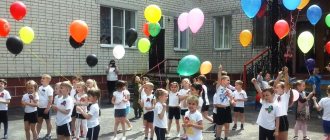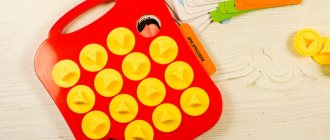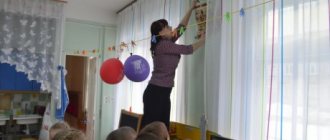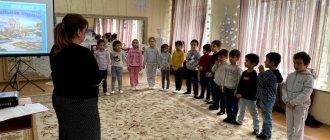Quest summary - games for June 1 - Children's Day in kindergarten in the senior group
Summary of the quest game for children of senior preschool age “The Adventures of Veselinka and the Bully”
I bring to your attention the summary of the quest game for children of senior preschool age “The Adventures of Veselinka and the Bully.” This material may be of interest to teachers of senior and preparatory school groups. The game develops children's curiosity and allows them to consolidate knowledge about the rules of behavior on the road, in the forest, and in nature. Promotes the development of a sense of collectivism and cognitive interest. Goal: Create a joyful festive atmosphere. Create a desire to take an active part in the holiday. Objectives: • stimulate joint play activities, • emotional responsiveness of children.
• Develop friendly relationships between children. Progress of events
Smeshinka: Hello, Hello, Hello! We are happy to greet you! How many bright smiles We see on faces now. Today the holiday has brought us together: Not a fair, not a carnival! The first summer day of the year will not send children into trouble. Ruffnut: Today is the first day of summer. This day is dedicated to International Children's Day and the preservation of peace on earth. This day is dedicated to you, dear guys. Today we have a fun holiday with you. We will sing, play, dance. And I suggest starting the holiday with a friendly round dance. Smeshinka: Ruffnut, what do you think, have our guys really matured? Do we need to test them in games, in dancing, in songs? Ruffnut: Check it out, huh? Please! (Takes out the ball). Here's the ball. Whoever doesn’t catch him hasn’t grown up, but remains a short child. He starts randomly, deceiving the children, throwing the ball to them. Two-Bit: Well, no! This will not work! If you're going to play, then for real. Ruffnut: How is this for real? Smeshinka: This means - according to the rules. Look, we’ll show you the game “How are you living?” If you want, we will teach you too. The game “How are you living?” is being played.
Children use their movements to show what the text says.
- How are you? - Like this! (stick their thumb forward) - How are you going? - Like this! (walk in place) - How are you swimming? - Like this! (imitate swimming) - How do you run? - Like this! (running on the spot) - How sad are you? - Like this! (they are sad) - Are you naughty? - Like this! (make faces) - Are you threatening? - Like this! (they shake their fingers at each other) The game is repeated 3-4 times, each time the pace becomes faster. Laughable. Imagine educators, Ruffnut claims that our boys and girls have not learned anything and cannot do anything. (Bully laughs maliciously). But I think quite the opposite. The guys didn’t waste any time during the school year. For example, do you know, Ruffnut, what you need to do in the morning? Bully. Of course I know! They still ask. You get up in the morning and immediately start doing all sorts of nasty things, lying and playing pranks. Laughable. But no! We will now teach you what to do in the morning. Smeshinka performs comic exercises to the cheerful music of “Makakun”. Bully. It’s you who are so grown up in kindergarten, but in the summer you can’t do without me, what will you do without me, so pretty and mean? Leading. And how many impressions await everyone in the summer! Many of you will travel, swim, walk in the forest, sunbathe on the beach, relax in the village. And, of course, you will have to follow safety rules. But now, we propose to go on a journey through the security stations. 1. Station “At Moidodyr”. The children receive a letter from Moidodyr: “Dear guys! I want to come visit you in kindergarten and find out if you follow the rules of personal hygiene? Do you wash your hands, wash your face, because I love neat, washed, combed children. I also want to know why it is necessary to wash your hands, wash your face, and clean your room. Get ready, see you soon!” The teacher invites the children to prepare for the meeting with Moidodyr. Educator: Children, did you wash your face today? Did you wash your hands? (Children's answers) Let's play now. 1. “Stomp - slam” . Stomp if I name something that is good for health: washing, fighting, doing exercises, washing your hands, walking in dirty clothes, forgetting to cut your nails, washing in the shower, wiping off dust, walking with dirty ears, vacuuming, etc. Clap if I name items that help people take care of themselves and keep their home clean: soap, garbage, shampoo, towel, dirt, broom, toothbrush, puddle, key, scissors, pencil, comb, mop, etc. 2. Let's play differently. I will name the words, and you will show the actions that they mean: brushing your teeth, washing your hands, washing, drying with a towel, rinsing your clothes, combing your hair, etc. (Children imitate actions). 3. And now we will play the outdoor game “What’s What.” Each of you will take one item from the box. When the music (or tambourine) starts, you will move around the area (veranda). When the music stops, please stand in pairs so that the objects in your hands fit together. For example: towel - soap, toothbrush - toothpaste, dustpan - broom. Music is playing. The outdoor game is played 3-4 times. Educator: Guys, why do you need to wash your hands, wash your face, wash your clothes, clean your room? Maybe you can do without it? Children: No, there may be germs around. They are afraid of soap and water. Educator: Of course, that’s why you need to wash your hands, take a shower, wash yourself, clean the house, etc. Shows illustrations. The teacher returns to the letter from Moidodyr, asks the children if they are ready to meet him, draw conclusions together and go to the next station. 2. Station “Rules of conduct in the forest and in nature.” Children, together with teachers, make posters about the rules of behavior in the forest and in nature. It is worth preparing material for artistic creativity in advance. 3. Station “Cat House” (rules of behavior in the house). The teacher conducts the “Firemen” relay race with the children. 1. "Fire-water." Children with a red ribbon are fire, those with a blue ribbon are water. The ribbons are attached to the children's belts in such a way that they can be easily pulled out. Children with a blue ribbon must collect all the red ones representing fire, i.e. "put out" the fire. We play 1-2 times. Educator. Fire brings warmth and joy to people, but sometimes it can become a dangerous and cruel enemy. In the path of fire, brave and smart, fast and resourceful people stand in the way - firefighters. They are fighting fire. There are many obstacles on the way of a firefighter before he gets to the victim; sometimes not only people, but also their loyal animals find themselves in the fire. Now you and I will save these animals. Let's be firefighters ourselves! 2. "Fire alarm." 2 teams participate. Children stand in a line. You need to overcome obstacles, save the animal and take it to the hospital. There are 2 chairs on one side and the other. On one chair there is a red cloth (this is fire), on the second chair there is a white cloth with a red cross (this is a hospital). 3. “Firefighting.” In the hands of the child in front of each team is a bucket of “water” (blue and white tinsel is glued inside the bucket as water). He must run between the pins, climb through the “window” (hoop), cover the distance by stepping over objects, “pour out the water” and run back. The next player performs the same actions. 4. “Smoky corridor.” Members of each team line up in front of their tunnel, take turns crawling along it, then run back. 5. “Two boots are a pair.” The legs are tied (the left leg of one player, the right of another). Holding hands, jump to the finish line. During a fire, the ability to work together and work together is very important. 6. "After the fire." Two players are selected from each team. They sit on chairs and pick up a reel, to which a cord is attached at one end. On command, the players begin to wind the cord. The one who finishes first wins. The game can be repeated several times - with the participation of other team members. At the end of the relay race, the teacher conducts a final conversation on safety rules in the house, consolidates children’s knowledge about fire safety rules, rules of conduct during a fire, and the profession of “firefighter,” using illustrations and models. The children go to the next station. 4. Station “Dangerous Plants” (mushrooms and berries). The teacher tells the children about edible and poisonous plants growing in the forest, clearing, and meadow. Useful plants are strawberries, raspberries, blueberries, lingonberries. These berries are edible and tasty and can be picked and eaten. They make jam and compotes (with illustrations) showing where these plants grow and what they look like. Then the teacher asks the children what poisonous plants they know. Is it possible to try them? What consequences can this lead to? The teacher shows the children images of poisonous plants and names them: this is a raven's eye, a wolf's bast, a lily of the valley, explains that the best means of protection against poisonous plants is not to touch a single flower or shrub if they are not familiar, because it can be dangerous even touching poisonous plants: cause skin burns with blisters and wounds. Then the teacher asks which mushrooms are considered edible and which are poisonous (while looking at the illustrations). Can you eat mushrooms raw? Where do mushrooms grow? What does the name “fly agaric”, “toadstool”, “russula”, “boletus”, “boletus”, “chanterelle” mean? The teacher plays the game “What is hidden in the picture?” Children unite into several subgroups and look for dangerous plants (berries, mushrooms or plants) in their picture and paint them over with colored pencils or felt-tip pens. Then the teacher and the children draw conclusions and go to the main site. Smeshinka: Ruffnut, did you see how well our guys did their tasks? Zabiyaka: And indeed our guys have grown up over the year, become smarter, stronger and more savvy. Kids, I know a fun song that's fun to dance to. Do you want me to teach you? (Aram Zam Zam). Smeshinka: Well, that's all, our holiday has come to an end, but that's not all. We have a little surprise for you.
We recommend watching:
Entertainment script "Children's Day". Senior group Entertainment in the senior group on Children's Day. Scenario of a holiday on the street Children's Day for children 6-9 years old. Scenario Children's Day in kindergarten. Middle - senior group. Scenario
Similar articles:
Summer holiday for preschoolers in preschool educational institutions. Script: Hello Summer
About the holiday June 1 - Children's Day
Conversation “Children's Day” in the senior preparatory group
Entertainment for June 1 in kindergarten. Preparatory group. Interesting scenario
Picnic!
For children 6-10 years old, this selection of “20 picnic competitions” is suitable. You can add some entertainment from “20 Ideas from an Animator’s Chest”, there are very simple props there.
I also wrote a wonderful script with games and competitions at the dacha “Cave of Three Parrots”. Be sure to check it out!
As a treat, I recommend preparing chicken skewers at home in a frying pan and in the oven, and at a picnic simply reheat them in foil.
Competition and game program
Considering that I cannot offer a single scenario for all occasions, since the choice of program depends on
- number of children
- age
- venues (kindergarten, club, courtyard, apartment, children's camp or sanatorium)
I can give links to the best collections of games and competitions that I have collected for various occasions. I have no doubt that you will find something useful here:
More than 100 competitions “by age” and “by occasion”. I’ll help you choose prizes: 100 ideas for 100 friends
Of course, for big and small holidays there are ready-made programs with animators, life-size puppets, unusual show numbers and prizes. Call us, we can tell you which holiday is most suitable for your children!
Read more about our programs HERE (relevant for Moscow)




